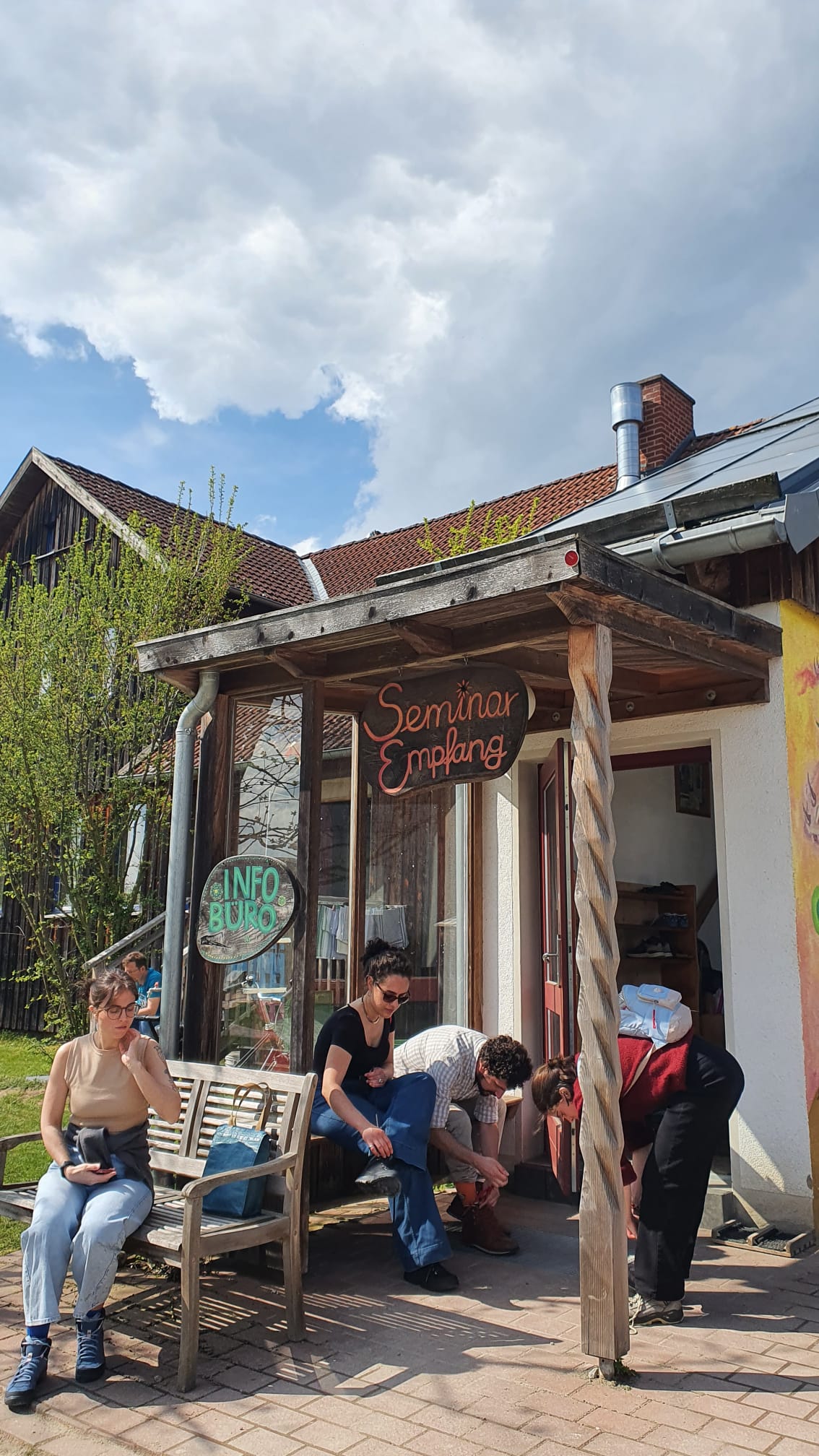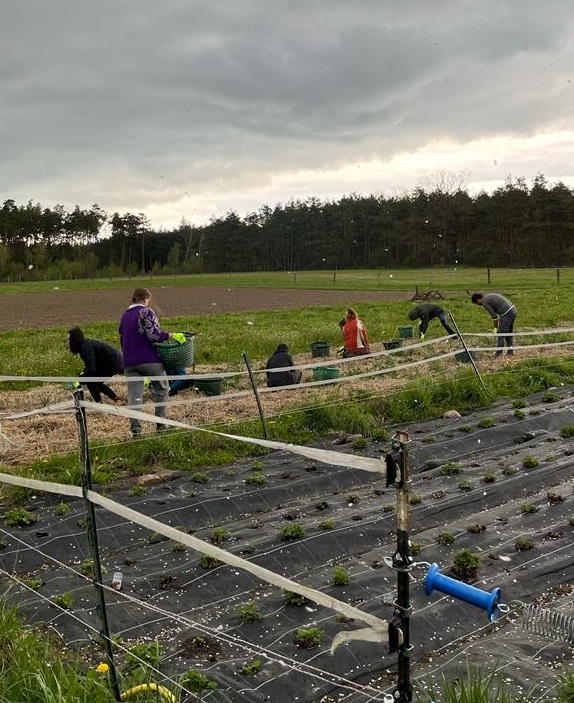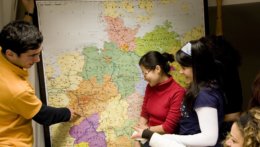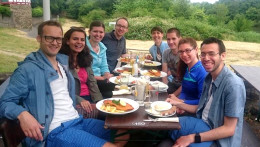 Ecovillage Sieben Linden, situated in the community Beetzendorf in the Altmark – District Salzwedel, Saxony-Anhalt, Germany, was established in 1997. It has the aim to realize collaborative and holistic sustainable lifestyles that connect a small ecological footprint with a high quality of life. A recent study of the university of Torino proves that we are on a successful way towards this aim. Currently a little more than one hundred adults and forty children and adolescents live in eleven straw-bale houses and about forty well-insulated construction trailers. The cooperatively organised village covers over a hundred hectars of land; there of 80 hectars of woods, which are managed sustainably. The core of the village is a half timbered ecologically restored farmhouse that accommodates the community and seminar rooms. In the garden fruits and vegetables are cultivated for self-sufficiency. Composting toilets, a sewage treatment plant and solar panel provide local energy and closed material cycles. The lean structures of the village offer the possibility to shape social, ecological, economic and cultural aspects. In the interaction of all those areas may develop a sustainable entity that offers space for the diversity, creativity and the different needs of the residents. The Ecovillage Sieben Linden is a liberal-minded and hospitable village. We welcome people from diverse cultural and social backgrounds, age groups, with and without disabilities. Ecovillage Sieben Linden defines itself as a village that strives for sustainability in all its 4 dimensions: Ecology, Economy, Social Life and Culture.
Ecovillage Sieben Linden, situated in the community Beetzendorf in the Altmark – District Salzwedel, Saxony-Anhalt, Germany, was established in 1997. It has the aim to realize collaborative and holistic sustainable lifestyles that connect a small ecological footprint with a high quality of life. A recent study of the university of Torino proves that we are on a successful way towards this aim. Currently a little more than one hundred adults and forty children and adolescents live in eleven straw-bale houses and about forty well-insulated construction trailers. The cooperatively organised village covers over a hundred hectars of land; there of 80 hectars of woods, which are managed sustainably. The core of the village is a half timbered ecologically restored farmhouse that accommodates the community and seminar rooms. In the garden fruits and vegetables are cultivated for self-sufficiency. Composting toilets, a sewage treatment plant and solar panel provide local energy and closed material cycles. The lean structures of the village offer the possibility to shape social, ecological, economic and cultural aspects. In the interaction of all those areas may develop a sustainable entity that offers space for the diversity, creativity and the different needs of the residents. The Ecovillage Sieben Linden is a liberal-minded and hospitable village. We welcome people from diverse cultural and social backgrounds, age groups, with and without disabilities. Ecovillage Sieben Linden defines itself as a village that strives for sustainability in all its 4 dimensions: Ecology, Economy, Social Life and Culture.
That is how Ecovillage Siebenlinden is described and presented on their facebook account. To that ‚far-out‘ place 15 international students ( e.g. from Greece, Jemen, Spain, Afghanistan, Persia, Belorussia etc.) went on a two-days‘ field-trip, organised by the Berlin DAAD-Freundeskreis. The focus of this excursion was getting an insight into sustainable living.
We stayed in the village guesthouse, had really tasty vegan food and were given a substantial tour through the village by Jonas, a long-term inhabitant of Siebenlinden, who covered many essential topics: e.g. the building of houses with straw bails, the question of how the ‚eco-people‘ earn their money (working outside the village, inside the village, home office). We were informed about the ‚democratic‘ way of making decisions, how the people organise themselves in committees, how the woods and the fields are looked after and how the composting toilets work.
In the evening we were shown the film ‚Not a really false life‘ that depicts life in Siebenlinden in many facets. Afterwards we had a long discussion with the film director, Michael Würfel. One of the issues was e.g. the ecological impact and imprint of vegan food. What about transporting vegan food from far away places of production? Why not eat the eggs of chickens that you can keep in your garden close by?
 On Monday morning Marlena, the Mexican gardener, gave us an introduction into agriculture and gardening in Siebenlinden, and then we got down to practical work: weeding the onion fields.
On Monday morning Marlena, the Mexican gardener, gave us an introduction into agriculture and gardening in Siebenlinden, and then we got down to practical work: weeding the onion fields.
We left the ecovillage, full of enthusiasm, having received many new stimuli for our own lives.
Some comments by participating students:
The trip to Siebenlinden was an unexpected initiative of the DAAD-Freundeskreis Berlin, and a short adventure that I enjoyed as few in my life. What will remain as a memory is the calmness that came along with waking up in a green village in the middle of nowhere and the curiosity to explore the different ways of living on this planet, to experiment and to explore. I felt a bit more free. Thank you, people of DAAD, for this experience. (E.V.)
It was a pure pleasure to spend the weekend among people, who are not only living differently but are also eager to share even the very personal details of their alternative lifestyle. Of no less importance for me was getting to know wonderful DAAD scholarship holders, who all share a great curiosity for Siebenlinden and ecological living in general, but from perspectives of different fields. Last but not least, I absolutely loved the delicious food cooked for us, and already tried out some of the ideas in my daily life: eating lamb’s lettuce (??) and drinking lupine coffee for the third day in a row! (L.M.)
I was particularly impressed by the use of innovative technologies such as solar panels, rainwater harvesting, and waste water treatment systems, which had significantly reduced the village’s carbon footprint. The villagers were committed to reducing waste and recycling, which had helped to keep the environment clean and healthy. Moreover, the eco village was not just about preserving the environment. It was also about building a close-knit community that was committed to living in harmony with one another. The villagers work together to maintain the village, with everyone contributing to the daily chores and responsibilities. The visit to the eco village was a truly eye-opening experience, and it has inspired me to continue exploring sustainable living practices. I believe that the lessons I learned from the village will be invaluable in shaping
my academic and personal pursuits. (S.N.)
Zusatzinformationen
Kategorien
- Allgemein (30)
- Deutschland hautnah (10)
- Veranstaltungsberichte (136)
Schlagworte
- Berlin - Brandenburg (55)
- Bonn (14)
- Braunschweig-Hannover (1)
- Dresden (4)
- Düsseldorf (2)
- Europa (1)
- Freiburg (3)
- Hamburg (1)
- Heidelberg (1)
- Karlsruhe (1)
- Köln (1)
- Magdeburg (1)
- Marburg (1)
- München (31)
- Potsdam (1)
- Rechtsextremismus (1)
- Regionalgruppe Hamburg (1)
- RG Ruhr (2)
- Rhein-Main (3)
- Rhein-Neckar (3)
- Saarland (5)
- Stuttgart (4)
- Trier (1)
- Tübingen (4)
- ulm (1)
- Veranstaltung (1)


